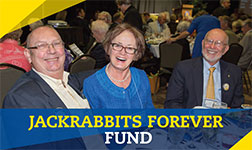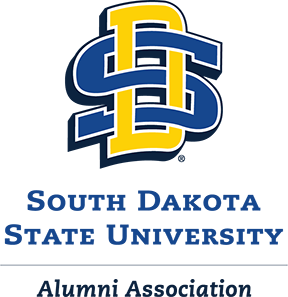Greek Life at South Dakota State
Before coming to college, many students perceive Greek Life in the way it’s depicted in the movies. But for more than 50 years, Greek Life at South Dakota State University has been home to high-achieving students and future leaders.
Whether it be coordinating blood drives, supporting the Brookings community or dedicating time to the thriving agricultural community at State, fraternity members consistently reflect their values in the actions and commitment to service while cultivating the bonds of friendship forming through sister and brotherhood.
Each chapter is dedicated to a philanthropic organization and gives back to the community on the local and national level. Students gain skills through holding chapter offices, hosting events, networking and demonstrating a commitment to the values of the Greek organization. Currently, two of the four women’s fraternities are supported by the National Panhellenic Conference, and six of the eight men’s fraternities are supported by the North American Interfraternity Conference.
Greek growth
Greek Life at SDSU is growing at a steady pace, with the total enrollment for the 12 fraternities being 332 in fall 2010, and reaching 554 in fall 2015.
According to Addie Borah ’06/’08, assistant director of student activities and former Greek Life adviser, the recent expansion of Greek Life can be attributed to a number of factors, a key being the administrative support for Greek Village. “For the last seven years, administrators have helped make Greek Village a reality, and have helped fraternities secure funding for the home-building process.
“Having Greek Village puts SDSU on an equal playing field with our peer institutions as far as their Greek communities go,†Borah said, adding that the next factor contributing to growth is the individual chapter leadership. “Students work hard to stay connected with the national organizations; going to trainings and recruitment conventions. Leaders within the fraternities use all of their available tools to improve their chapters each year. The whole community has bloomed in the last few years.â€
Borah said Greek Life has the revolving goal of continuing the momentum of growth. “We want to grow at a sustainable pace where we are able to support the chapters in the best ways possible,†Borah said. “The rate in which we’ve been growing is the best. We have a unique Greek community in that it’s smaller, so everyone is close-knit. There are little healthy rivalries, but in the end, everyone is supportive of each other’s efforts. As we grow, we want to maintain that special feeling, and continue to foster that within our growing community.â€
The SDSU Greek community has a fit for any students interested in exploring Greek Life. From the classroom and major-specific fraternities, to Students’ Association and the arts, members’ interests are vast and expanding.
Sisterhood, ag interest
Ceres fraternity has been chartered at State since 1991 and currently has 45 members. The group centers around an agricultural interest, however women within the fraternity have varying majors. Relay for Life is the fraternity’s national philanthropy. The fraternity also partners with Colleges Against Cancer, and this year, Ceres held a date auction, which raised $3,000.
A house for Ceres is planned to be completed in Greek Village by fall 2016. An example of the close-knit Greek community, Ceres is using what was the previous FarmHouse as the top level of its new house.
Adilene Rojas, an agriculture leadership major on track to graduate in 2017, didn’t grow up with an ag background, but decided it was an area of interest when she came to State in 2012. “I love spreading awareness and being in the ag community,†Rojas said.
Rojas also served on the Unified Council at State, which includes a representative from each fraternity—both men and women’s—as well as 10 chosen executive members. The governing group is made up of students who are on either the Interfraternity Council or Panhellenic Association. According to Alan Haarstad ’11, Greek Life adviser, the role of the Unified Council is to handle broad judicial issues like disagreements between fraternities. Members are in charge of maintaining and enforcing bylaws passed down from the national organization, adapting rules or regulations to fit Greek Life at State.
Oldest, largest women’s fraternity
Chi Omega was the first women’s fraternity founded at SDSU in 1967, and is also the largest with 100 members. The chapter houses some of its members in the Meadows apartments, but the group plans to build on a plot of land at Greek Village, which was set aside by SDSU.
Matylin Kerr ’16, who served as the most recent Panhellenic president, knew she wanted to be a Jackrabbit and a Chi Omega sister when she was in third grade. She visited her sister Emily Kerr ’06 who was a member of Chi Omega and knew she wanted to be involved when she came to college. During her time in the fraternity, Kerr served as Panhellenic president for two terms and as chapter vice president and treasurer.
Kerr said when individual fraternities host small social events, such as pumpkin carving, group meals or fishing trips—they are referred to as socials, and when all of the fraternities come together to plan and host public social events, like campus dances and fundraisers, they’re called Big G’s. “We have members of all different majors, and I know I probably wouldn’t have had the chance to meet and become close with them in any other capacity,†Kerr said.
World travel, leadership
Delta Chi was founded in 2001 and has 52 members. The group’s main philanthropy is the Jimmy V. Foundation for cancer research. The university’s most recent Students’ Association president, Caleb Finck ’16, was part of Delta Chi for three years.
“Delta Chi has helped me establish and continue my community service, and also meet a lot of notable alumni who now serve as community leaders and businessmen,†he said. According to Finck, Delta Chi has a strong history with the South Dakota Art Museum. “We provide valet parking and coat checks for many of the events held at the museum, and we provide those same services for athletic-related events. We’ve also volunteered with the cities of Brookings and Volga and the Rotary Club for the Brookings Boulevard Project, where we plant trees for community members.â€
Delta Chi currently owns a remodeled home on the bypass north of Brookings. The group has three main missions: personal development, world travel and brotherhood. “Members of our SDSU chapter have already been to 80 percent of the world,†Finck said. “We know leadership and opening ourselves to new perspectives comes through traveling and experiencing the world.â€
The group makes a point to bring in prominent individuals to speak on personal development. “We’ve had Jason Merkley with Brookings Health System come speak to us, Al Kurtenbach with Daktronics, and Sioux Falls’ Mayor Mike Huether, to name a few. We want to learn about all aspects of leadership and hear examples and stories from community and thought leaders.â€
Largest men’s fraternity
FarmHouse fraternity was the second men’s fraternity at State, founded in 1966. The group has 63 members with its main philanthropy being the Leukemia and Lymphoma Society. The construction of a new house was completed in 2015, replacing the fraternity’s previous house on Greek Village.
Tyler Swan ’16 was introduced to FarmHouse in 2013 through his activities in the National FFA organization (formerly Future Farmers of America). Swan said the best memories he has had with his brothers come from trips they’ve taken. Each spring break the men visit the Black Hills and spend time in Deadwood and Spearfish Canyon. They also help an alum brand Herefords in Belle Fourche each year.
Each fall and spring members volunteer at Lake Campbell removing and replacing docks, jet ski and boat lifts. They also host the Totally Baldacious event, where members shave their heads to raise money for a local child who has cancer. The total funds raised at the event go to the family, and then FarmHouse matches that and donates the money to the national organization.
20 years as housemother
Deb DeBates, former professor of family and consumer sciences education, served as the FarmHouse housemother from 1992-2013. She came to State in 1991 to earn her master’s degree and was working as an instructor.
“Based on what the men were looking for in a housemother, I carved out activities and responsibilities I would take over or teach them,†DeBates said. “I made them treats during finals week and threw them Halloween parties.â€
DeBates taught the men etiquette classes, answered questions, helped with disputes in the house, and traveled to national conventions. DeBates stays connected with many of the FarmHouse alumni through Facebook. She said she’ll never forget a group of men who lived in the house in the late 1990s, early 2000s. “On some nights, they’d come home from downtown and would make breakfast in the kitchen, which was right below my apartment,†DeBates said. “It was fine with me, but I could always hear them clamoring around. They had this tradition of singing Bye Bye Miss American Pie at the top of their lungs. They were a fun group.â€
Regaining charter
Lambda Chi Alpha was originally founded in 1967, but lost its charter in 2005. The 18-member chapter has been in colonization state, on track for charter since 2013. The group’s main philanthropy is Feeding America.
Nick Wendell ’04, director of student engagement at State, was a member of Lambda Chi Alpha from 2000-2004 and said the experience was phenomenal. “I remember seeing all of the Lambda Chi members in blue shirts on recruitment day, and it just looked like something fun to be a part of,†Wendell said. “Now, I encourage students to take advantage of the transient nature of the college experience. And if they’re part of Greek Life, I encourage them to spend time cultivating and recruiting members so they have replacements.â€
Lambda Chi is currently in the process of recolonization, with the goal of regaining its charter this fall. “It’s an uphill process,†Wendell said. “But I know the members have been working hard to reestablish their presence.â€
Wendell remembers the fraternity members being closely involved with the other campus groups. “We did an annual Thanksgiving dinner with Alpha Xi Delta, and we went caroling and carved pumpkins with other fraternities, and just tried to maintain connected with a positive, competitive spirit.â€
Chicoines in fraternities
David Chicoine ’69, the university’s 19th president, and wife Marcia ’71 were both involved in Greek Life during their undergraduate years at State.
David served as president of Lambda Chi Alpha colony in 1967 (chartered in 1967 as Lambda Theta Zeta), and Marcia served as president of Chi Omega that same year. The two became involved with Greek Life through their peer groups, and were tasked with the responsibilities of establishing and building their chapters alongside their brothers and sisters.
David remembers the first house Lambda Chi members lived in. During the summer of 1967, the group rented a house at 1212 6th Street and began fixing it up for 10 of the members who crowded into the four bedrooms. “Our main goal with Lambda Chi was building and growing the chapter,†David said. “After we fixed up the house on 6th Street, we held chapter meetings in the basement, which pretty much was a cellar.â€
Marcia was introduced to Chi Omega when a friend in an art class invited her to tea with the sisters. “It was a small group of women and it sounded fun. I wasn’t really involved in much at that time, so I was excited to meet new people,†Marcia said. She lived in Scobey Hall and then the Annex and remembers having a housemother and a strict curfew—10:30 p.m. on weeknights and midnight on the weekends.
Marcia remembers getting together with other chapters for socials and rush. “Lake Campbell was one of our favorite places for socials,†Marcia said. “During the times when we were inviting people to join, we put on skits and sang songs to appeal to prospective members.â€
“All students need take a look at the options available to them on campus,†David said. “If joining a fraternity is appealing to students, I say that it will make their time at university richer and creates another option to meet peers. Some students get involved with other types of extracurricular activities, and those are great options to form connections as well.â€
Because Greek organizations were just getting their start at State in the 1960s, members focused on building their groups and maintaining academic scholarship more than community service and philanthropy, which are important aspects of each fraternity today.
The Chicoines still keep in touch with friends they met in Greek Life. “Bob Todd and Diane Cockel, two people who became friends through Lambda Chi and Chi Omega got married and moved to Urbana Champaign,†David said. “When Marcia and I moved there for graduate school, Bob and Diane had just arrived at the University of Illinois where Bob was director of the student union. After I went on the faculty and both of us progressed in our careers at Illinois, we became great friends, and we ended up living just down the street from each other for 20 years, until Marcia and I returned to SDSU.â€
Marcia said she intends to be more involved with Chi Omega in the future. “David has supported the recolonization of Lambda Chi, helping with alumni weekends and serving on the colony’s Alumni Advisory Council,†Marcia said. “I will help out more with Chi Omega now that David is stepping away from the presidency.â€
Karissa Kuhle






